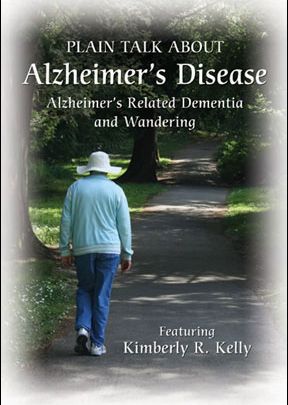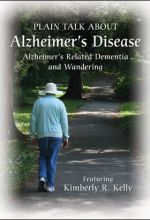Plain Talk About Alzheimer's Disease
Kimberly R. Kelly talks about Alzheimer’s and Related Dementia followed by the most feared and little known aspects of Alzheimer’s: Wandering. Kim has a wonderful ability to explain in a simple and understandable way the effects Alzheimer’s has on a person’s brain and behavior. She also explains what current drug therapies are being used to treat patients.
- Item 501295D
- Region: All
- Media Type: DVD
- Running Time: 61 min
Alternate formats: Digital Video - $3.99
Awards
-
Finalist
The 2009 Freddie Awards -- International Health and Medical Media Awards
Description
Ask anyone who has been through it: seeing a friend or loved one deteriorate with Alzheimer’s is one of the most painful experiences to behold. Here is help in understanding what is happening.
Kimberly R. Kelly talks about Alzheimer’s and Related Dementia followed by the most feared and little known aspects of Alzheimer’s: Wandering. Kim has a wonderful ability to explain in a simple and understandable way the effects Alzheimer’s has on a person’s brain and behavior. She also explains what current drug therapies are being used to treat patients.
Kim is the founder and executive director of Project Far from Home (www.projectfarfromhome.org), an Alzheimer’s education program designed for law enforcement, fire, EMS, and search and rescue. She was awarded the President’s Volunteer Service Award from President George W. Bush and the Alzheimer’s Association Award.
This two-part program provides an invaluable introduction to this progressive and incurable brain disease.
Part 1: Alzheimer’s and Related Dementia, 38 minutes
Part 2: Wandering, 23 minutes
Editorial Reviews
Video Librarian - March/April 2009
Kimberly R. Kelly, founder and director of Project Far From Home (an Alzheimer's education program designed for law enforcement and emergency services personnel), is the talking-head host for this no-frills two-part lecture presenting a general overview of Alzheimer's disease followed by specific suggestions on dealing with the issue of wandering, common to sufferers of Alzheimer's and other forms of dementia. Despite the "plain talk" of the title, Kelly opens with a fairly technical description of what happens to the brain of the person with Alzheimer's - down to the synaptic level - spoken at a rather fast pace. After the opening scientific barrage, however, Kelly presents statistics regarding the prevalence of Alzheimer's (one in eight over the age of 65), followed by an explanation of the "A" triad - agnosia, aphasia, and apraxia - which impair visual information processing, language abilities, and motor skills, respectively. Kelly next looks at a handful of other traits often related to the illness, including sundowning (increasing confusion in the evening hours), layering (incorrect dressing, such as putting socks over shoes), and wandering. In the second part of the program, Kelly talks more about the fact that persons with Alzheimer's can wander - usually motivated by food, fear, frustration, or pain - and become lost, suggesting helpful tips for wander-proofing a home (included wallpapering a door to look like part of the wall) and making sure that family caregivers have a good recent photo on hand and a knowledge of their loved one's history and experience (which might offer clues to their whereabouts). Although not as comprehensive as the seven-hour "The Savvy Caregiver", "Plain Talk About Alzheimer's Disease" does present a solid overview of this devastating illness, zeroing in on the classic symptoms while also featuring a handful of solid suggestions for caregivers. - R. Pitman
Baptist Bulletin - March/April 2010
Few maladies meet with more dread and fear than Alzheimer's and related dementia. This DVD, featuring Kimberly Kelly, founder and director of an Alzheimer's education program, throws light on the condition. She was awarded the President Volunteer Service Award by President George W. Bush and the Alzheimer's Association Award. Kelly explains current treatment and gives attention to what is know as Alzheimer's Wandering.
Customer Reviews
This product does not yet have any customer reviews


